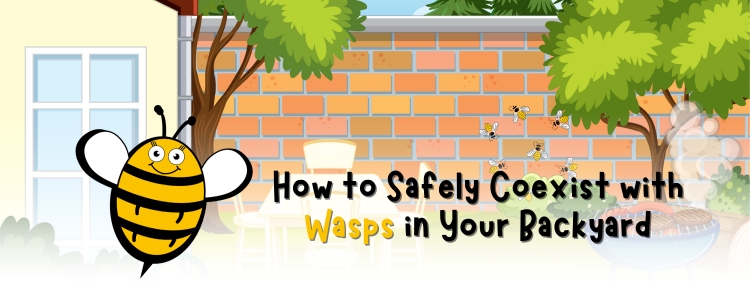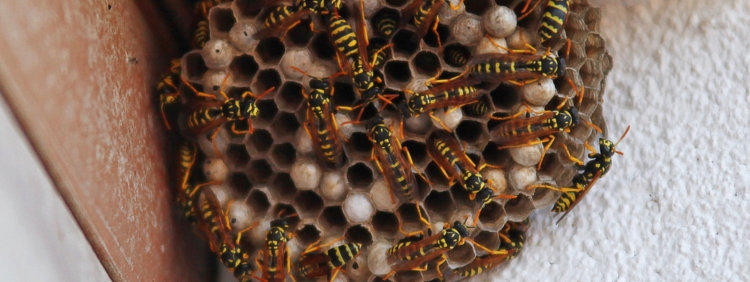 As warmer weather approaches and you start spending more time outside, it's important to know how to safely coexist with the insects that share your backyard. Flying insects can be a real nuisance, and most people want to know how to get rid of wasps, for example. But before you reach for that can of bug spray or call for wasp removal in Niagara, it's important to understand the difference between the various types and how they behave. With the right knowledge and a few simple tips, you can learn how to peacefully coexist with these stinging insects.
In this blog post, we’ll explore helpful information about these pests, including how to identify them, what to do if you find a nest, and how to prevent them from becoming a problem in the first place. Get ready to say goodbye to the intimidation that wasps bring, and hello to enjoying your backyard in peace.
As warmer weather approaches and you start spending more time outside, it's important to know how to safely coexist with the insects that share your backyard. Flying insects can be a real nuisance, and most people want to know how to get rid of wasps, for example. But before you reach for that can of bug spray or call for wasp removal in Niagara, it's important to understand the difference between the various types and how they behave. With the right knowledge and a few simple tips, you can learn how to peacefully coexist with these stinging insects.
In this blog post, we’ll explore helpful information about these pests, including how to identify them, what to do if you find a nest, and how to prevent them from becoming a problem in the first place. Get ready to say goodbye to the intimidation that wasps bring, and hello to enjoying your backyard in peace.
Understanding The Benefits Of Wasps In Your Backyard
Wasps are more than just an occasional garden nuisance. In fact, they play a significant role within our ecosystem and can even benefit our own backyard habitats. While it might be a little unnerving to share your space with these buzzing critters, understanding their importance can help change your perspective and encourage a more harmonious coexistence.Role as Pollinators
It's common knowledge that bees do the heavy lifting when it comes to pollination. Less known is the fact that wasps also contribute significantly to this critical process. When a wasp visits flower after flower seeking nectar, they inadvertently pick up pollen on their bodies, which is then transferred to subsequent flowers they visit. This facilitates the production of seeds and ultimately helps in plant reproduction.Wasps as Pest Controllers
In addition, wasps are natural pest controllers. Larvae for instance consume vast amounts of insects to satisfy their high protein needs. In many cases, these 'prey' insects are notorious pests that wreak havoc on our garden plants. An active population in your yard can therefore significantly reduce the number of harmful insects and protect your greenery from damage.An Indicator of a Healthy Ecosystem
Lastly, the presence of wasps in your backyard often indicates a healthy ecosystem. These insects require various plants and animals to survive, so their presence can be seen as a confirmation of the range and health of other local species too. So, while they can be a little irritating at times, remember that their presence shows your backyard is a thriving environment! In conclusion, wasps have significant benefits for your backyard and understanding this is key to promoting peaceful co-residence. Recognizing their role in maintaining the health of your garden and mitigating pest populations can make the occasional sting feel like a small price to pay for a robust and thriving backyard ecosystem.Landscaping Tips To Minimize Encounters In Your Yard
You might be surprised to discover that your choice of plants, landscaping, and outdoor decor can significantly influence the number of encounters you experience while enjoying your yard. Let's dive into some strategies that can help you create a backyard that's less inviting to wasps, without disrupting the ecological balance.Choose Your Plants Wisely
Some plants are known to attract bugs, while others may deter them. Planting more wasp-repellent plants like wormwood, citronella, and marigolds can help keep them away. At the same time, try reducing the number of attractive plants such as sweet fennel, Queen Anne's lace, and yarrow in your garden.Regularly Monitor for Activity
Regular yard checks can go a long way in preventing unpleasant surprises. You should keep an eye out for traces of wasp activity, like hovering insects or recurring trail patterns, especially during the warmer months.Maintain Cleanliness
Wasps are drawn to sweet food and drinks, pet food, and garbage, so keeping outdoor dining areas clean and well-sealed will reduce encounters. Sun-ripe fruits in your orchard should be picked promptly to avoid attracting them.Keep Water Sources Covered
Like all living creatures, wasps need water for survival. Covering water bodies or regularly changing water in bird baths and pet bowls can help make your yard less appealing. Implementing these simple steps together should help you in creating a yard that safely cohabits with wasps.Managing Nests Safely: Expert Advice And Best Practices
Wasp nests, often cone-shaped and found in sheltered areas such as eaves, attics, and tree branches, can be a worry for homeowners. However, if approached correctly, managing nests can be done safely and efficiently. Here's the experts' take on best practices.

